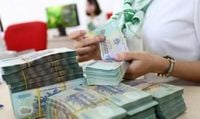The Ministry of Finance is currently researching the calculation of a real estate transfer tax as part of its ongoing efforts to amend the Personal Income Tax Law. In a report submitted to the National Assembly, the Ministry outlined its plans to refine legal regulations concerning real estate transactions, aiming to optimize tax revenue from personal income tax related to these transactions.
According to the Ministry of Finance, this research focuses on two potential methods for calculating taxes on real estate transfers, which will depend on the availability of accurate transaction data. If a reliable database exists that can determine the purchase price and associated costs of real estate transfers, the Ministry proposes applying a tax rate of 20%. This rate aligns with the corporate income tax rate applicable to businesses engaged in real estate transactions.
In cases where the purchase price and related costs cannot be accurately determined, the Ministry suggests a simplified approach where personal income tax would be calculated based on the total transfer price of the real estate, applying a lower tax rate of 2%. This dual approach aims to ensure that tax collection aligns with the economic realities of real estate transactions.
To effectively implement this tax calculation method, two critical conditions must be met. First, there needs to be a comprehensive database that accurately reflects historical transaction prices for real estate. The Ministry noted that while the tax authority has been able to track transaction histories since 2018, discrepancies still exist between reported prices and actual transaction values.
Secondly, clear regulations must delineate what expenses can be deducted and the necessary documentation required to substantiate these costs. The Ministry acknowledged that determining deductible costs is challenging, particularly since many expenses related to real estate transfers can be difficult to verify. For instance, while costs like purchase prices, construction, and repair expenses are straightforward, others such as brokerage fees and interest payments can be much harder to document.
Moreover, the Ministry pointed out that some properties may have been inherited or gifted, complicating the determination of their purchase price. This adds another layer of complexity to the tax calculation process.
In another significant financial update, the State Bank of Vietnam has reported a reduction in lending interest rates, which have dropped by 0.6% as of April 10, 2025. The average interest rate for new transactions at commercial banks now stands at 6.34% per year, a move aimed at supporting businesses and individuals amid current economic challenges.
The State Bank has been actively maintaining low operating interest rates to encourage lending and stimulate economic growth. It has also directed credit institutions to reduce operational costs and enhance digital solutions to further lower lending rates. This strategy is part of a broader effort to stabilize the economy and control inflation.
Despite these efforts, the foreign exchange market remains under significant pressure due to various international economic and political factors. The ongoing volatility of the international economy, particularly related to U.S. trade policies and fluctuations in the U.S. dollar, has created a complex environment for Vietnam's currency.
As of April 22, 2025, the VND/USD exchange rate was trading around 25,896 VND per USD, reflecting a 1.64% increase compared to the end of 2024. The State Bank has been managing exchange rates flexibly, utilizing various monetary policy tools to stabilize the foreign exchange market and ensure that the economy's demand for foreign currency is met.
Looking ahead, the State Bank has warned of potential challenges that could impact interest rates. Although monetary policy has remained stable, inflationary pressures are rising due to the open nature of Vietnam's economy and global commodity price fluctuations exacerbated by geopolitical tensions.
Several factors are expected to exert pressure on interest rates in the coming months. The recent trend of declining lending rates could reverse as demand for credit increases significantly, driven by economic growth targets for 2025. Additionally, competition from alternative investment channels, such as real estate and the stock market, may impact the overall funding landscape for credit institutions.
Moreover, global interest rates, while generally declining, remain relatively high, and the unpredictable nature of global financial markets—especially following recent U.S. tariff announcements—adds to the uncertainty. The State Bank has also indicated that exchange rates and the foreign currency market may continue to face pressures from complex international factors and domestic challenges, such as the persistent demand for foreign currency within the economy.
In conclusion, the Ministry of Finance's exploration of real estate transfer tax calculations and the State Bank's adjustments to lending rates reflect the Vietnamese government's proactive stance in navigating the complexities of its economic landscape. As these developments unfold, they will be closely monitored for their impact on the broader economy and individual citizens.





